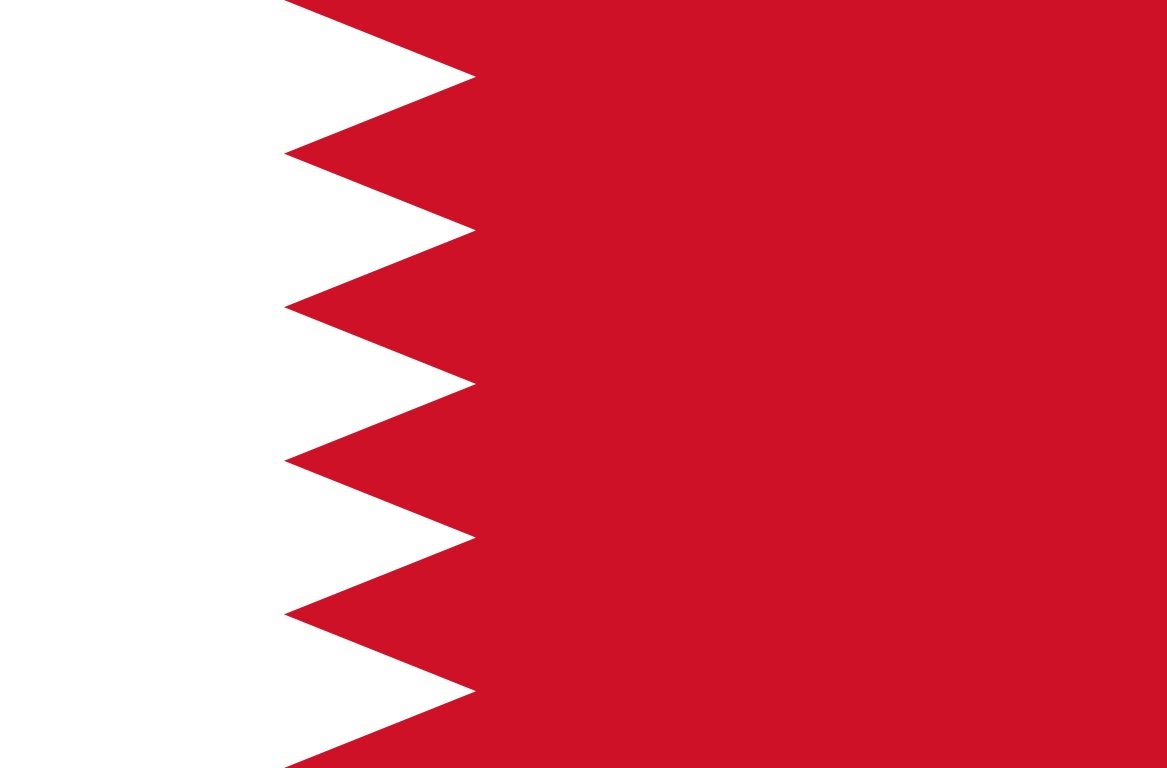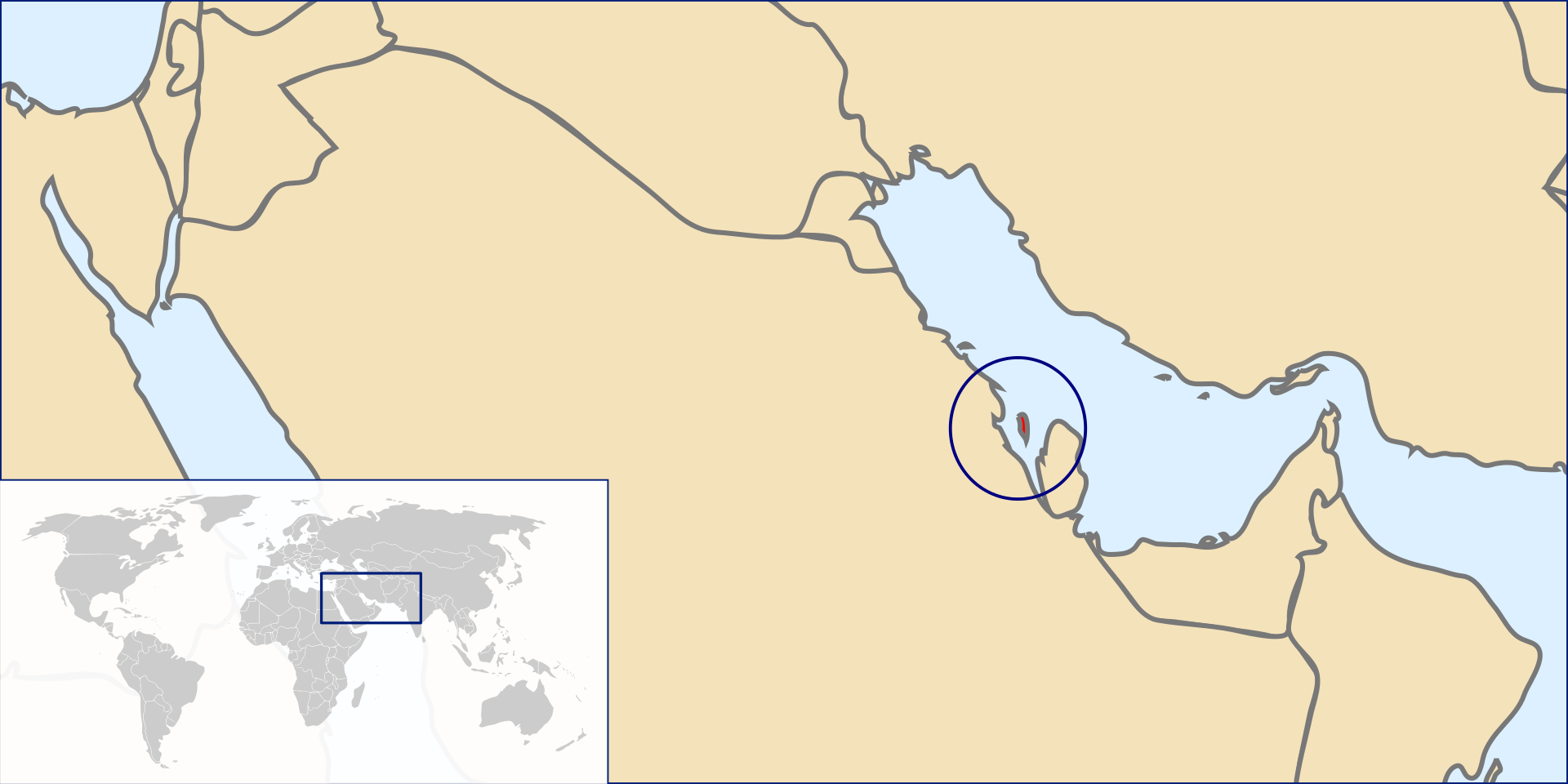
Geography

Source: This image is the intellectual property of Rei-artur. Redistribution under licence CC BY-SA 3.0
Area: 760 km2 (0% water)
Coastline: 161 km
Terrain: mostly low desert plain rising gently to low central escarpment
Highest point: Jabal ad Dukhan 134 m
Climate: arid; mild winters; very hot and humid summers
Geographical population distribution: Over 80% of the population is concentrated in the northern half of the island
Natural resources: oil, natural gas, fish, pearls
Demographics
Population: 1,701,580 (2020)Annual population growth: 3.6% (2020)
Population estimate in 2025: 1,865,000
Population distribution by age group (2020)0-14 – 18%
15-64 – 79%
65+ – 3%
Fertility rate (births per woman): 2 (2019)
Birth rate (births per 1000 people): 14 (2019)
Death rate (deaths per 1000 people): 2 (2019)
Median age: 32.9 years (2021)
Life expectancy (at birth): 77 years (2019)Males – 76 years
Females – 78 years
Net migration: 239,000 (2017)
Language: Arabic is the official language
Religious groups: Muslim 73.7%, Christian 9.3%, Jewish 0.1%, other 16.9% (2017)
Ethnic groups: Arabs 57.7%, Asian 23.8%, Persians 16.6%, White (Europeans) 1.9% (2013)
Economy
GDP: $34.73 bil (2020) GDP per capita: $20,410.0 (2020) GDP annual growth rate: -5.1% (2020) Public debt (% GDP): 93.4% (2019) Inflation (CPI): -2.3% (2020) Unemployment: 4.1% (2020) Imports: $20,597,535,923 (2018)10 largest import partners (% total imports - 2018): Saudi Arabia 33.1%, China 9.1%, UAE 6.4%, USA 5.9%, Australia 4.6%, Japan 3.9%, India 3.7%, Brazil 3.3%, Germany 2.82%, France 2.4% Exports: $14,347,737,494 (2018)
10 largest export partners (% total exports - 2018): Saudi Arabia 13.3%, UAE 6.1%, USA 4.8%, Oman 4.6%, Egypt 3.6%, China 2.3%, India 2.2%, Kuwait 1.8%, Turkey 1.7%, South Korea 0.8% Global Competitiveness Report (World Economic Forum)
65.4/100 (2019 – position 45/141) Index of Economic Freedom (Heritage Foundation)
69.9/100 (2021 – position 40/180) Income Inequality Index (Gini – World Bank)
- Prosperity Index (Legatum Institute)
66.46/100 (2021 – position 56/167)
Military Power
Active Personnel: 10,000 (2021)<>br/ Army 7.500Navy: 1,000
Air Force: 1,500
National Guard: 3,000 (2021)
Defence expenditure (% GDP): 4.1% (2020)
Politics and Government
Form of government: Constitutional monarchy King: Hamad bin Isa Al Khalifa (2002 – Emir from 1999 to 2002)Prime Minister: Crown Prince Salman bin Hamad Al Khalifa Executive branch: The King of Bahrain is the country’s head of state and exercises executive authority with the assistance of the Council of Ministers which is chaired by the Prime Minister. The Prime Minister is the head of government and he is appointed by the King. Members of the Council of Ministers are nominated by the Prime Minister and appointed by the King. The rule of the country is hereditary in the family of Al-Khalifa and the King may be replaced only upon his resignation or death. Among other powers, the King can amend the constitution, propose legislation and ratify laws. Legislative branch: The National Assembly is the country’s bicameral parliament. The Consultative Council is the upper house of parliament composed of 40 members appointed by the King for a 4-year term. The Chamber of Deputies is the lower house and consists of 40 members who are elected directly for a 4-year term. In order for a bill to become a law, it must be approved by both chambers and ratified by the King. The Chamber of Deputies may initiate a vote of no-confidence against the Prime Minister by a majority of two-thirds of its members. If such a majority is achieved, the matter is put to a vote in the entire National Assembly. In case two-thirds of the National Assembly vote against the Prime Minister then the King must decide whether to replace the Prime Minister or the Chamber of Deputies. Judicial branch: The Higher Judicial Council is chaired by the King and ensures the proper functioning of the court system and the Public Prosecution Office. All judges are appointed by the King. Bahrain’s court system has three types of courts: criminal courts, civil courts and religious (sharia) courts. The Court of Cassation is the country’s highest court and the Constitutional Court ensures the compliance of laws with the constitution. The President and the 6 members of the Constitutional Court are appointed by the King upon nomination by the Higher Judicial Council. Any law may be submitted to the Constitutional Court by the King before it is passed while the High Civil Appeals Court is the highest appellate court. Parliamentary parties (seats): Assala Association 3, Unity Gathering Assembly (all other members were elected as Independents). The Chamber of Deputies consists of the following political groups: Bahrain 11, Almethaq 6, Assala Association 3, Taqadom 2, Unity Gathering Assembly 1, Independents 17 (political parties are banned - political ‘associations’ are permitted). Last elections: Simultaneous parliamentary and municipal elections 2018 – Turnout 67% in the first round of parliamentary elections (36.8% in the second round) and 70% in municipal elections (out of 365,467 voters)
Next elections: Parliamentary and municipal elections 2022
Rule of Law - Human Rights
Corruption Perceptions Index (Transparency International)42/100 (2020 - position 78/180) Rule of Law Index (World Justice Project)
- Global Terrorism Index (Institute for Economics & Peace)
3.201/10 (2019 – position 61/163) Fragile States Index (Fund For Peace)
66.7/120 (2021 – position 104/179) Democracy Index (Economist Intelligence Unit)
2.49/10 (2020 – position 150/167) Press Freedom Index (Reporters Without Borders)
61.10/100 (2021 – position 168/180) Freedom in the World Index (Freedom House)
12/100 (2021)




